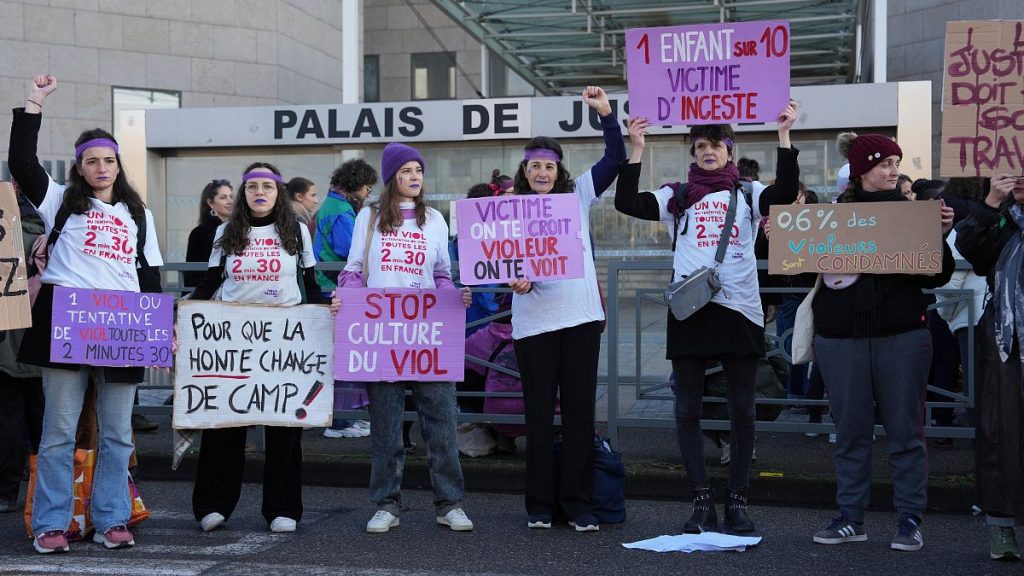The trial of Dominique Pelicot and 50 other men for the systematic rape of his wife, Gisèle, over a decade has sent shockwaves through France. The case, which concluded with guilty verdicts for all defendants, exposed the horrific extent of Pelicot’s crimes and transformed Gisèle into a symbol of resilience and a catalyst for change in how France addresses sexual violence. Pelicot, sentenced to 20 years, drugged and raped his wife while she was unconscious, meticulously documenting the abuse in over 20,000 photos and videos. He also invited other men he met online to participate in the assaults, turning their home into a scene of repeated violations. The scale of the abuse, the vulnerability of the victim, and the complicity of so many individuals sparked national outrage and prompted calls for legal reforms.
The case began unraveling in 2020 when Pelicot was caught filming up women’s skirts in a supermarket. This seemingly minor offense led to a search of his electronic devices, uncovering a vast archive of horrific images and videos documenting years of abuse inflicted on his unsuspecting wife. The files, categorized into folders with disturbing titles like “abuse,” “her rapists,” and “night alone,” provided irrefutable evidence of Pelicot’s crimes and led investigators to identify and charge his accomplices. While 72 abusers were identified in the videos, not all could be identified. The sheer volume of evidence and the systematic nature of the abuse shocked the nation and brought the issue of marital rape and consent to the forefront of public discourse.
The three-month trial in Avignon became a focal point for discussions about sexual violence and consent. Gisèle’s bravery in testifying, her willingness to speak openly about her ordeal, and the unflinching support she received from feminist groups transformed her into a national heroine. Local activists organized protests throughout the trial, displaying banners and slogans around the courthouse, demanding justice for Gisèle and calling for stricter measures against sexual violence. Their unwavering support for Gisèle provided a powerful demonstration of solidarity and helped to amplify her voice. The trial became a platform for a broader societal reckoning with the issue of consent and the insidious nature of rape culture.
The trial highlighted the complexities and ambiguities surrounding the legal definition of rape in France. While some defendants admitted their guilt, others, even when confronted with video evidence, denied any wrongdoing. Some argued that Dominique Pelicot’s consent implicitly extended to his wife, a disturbingly common misconception that often underpins cases of marital rape. Others claimed they had been misled by Pelicot, believing they were participating in consensual acts. These defenses exposed a critical gap in French law, where the absence of explicit mention of consent creates loopholes that perpetrators can exploit. The trial fueled a growing movement advocating for legal reforms to explicitly include the concept of consent in the definition of rape, closing this dangerous loophole and offering greater protection to victims.
The impact of the Pelicot case extends beyond the legal realm. It has sparked a national conversation about sexual violence, consent, and the pervasiveness of rape culture. The sheer scale of the abuse, the calculated nature of Pelicot’s actions, and the complicity of so many other men have forced French society to confront uncomfortable truths about the prevalence of sexual violence and the inadequacy of existing legal frameworks. The trial has empowered victims to come forward, emboldened activists to demand change, and challenged societal norms that normalize and excuse sexual violence.
The Pelicot trial has left an indelible mark on French society. Gisèle’s courage, the tireless efforts of feminist activists, and the widespread public outrage have created momentum for meaningful legal and societal change. The trial has laid bare the urgent need to strengthen legal protections for victims of sexual violence, to educate the public about consent, and to dismantle the insidious structures that perpetuate rape culture. The case serves as a stark reminder of the ongoing struggle for gender equality and the importance of holding perpetrators accountable for their crimes. It also underscores the vital role of collective action in challenging societal norms and creating a safer and more just society for all.










